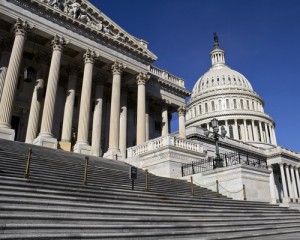 On November 7, the Senate passed the Employment Non Discrimination Act (ENDA), which would amend Title VII to add discrimination protections to homosexual and transgendered employees. Ten Republicans voted for the legislation, but the primary argument against the bill is the lack of a strong exemption for faith based businesses. The current piece of legislation would only exempt explicitly religious organizations, like churches, but would not provide an exemption to a private faith based school or hospitals.
On November 7, the Senate passed the Employment Non Discrimination Act (ENDA), which would amend Title VII to add discrimination protections to homosexual and transgendered employees. Ten Republicans voted for the legislation, but the primary argument against the bill is the lack of a strong exemption for faith based businesses. The current piece of legislation would only exempt explicitly religious organizations, like churches, but would not provide an exemption to a private faith based school or hospitals.
The bill has little chance of passing the House of Representatives, so it is not likely to become law. ENDA was last voted on in the Senate in 1996, when it failed by one vote, so this is the first time it has passed one house of Congress. It is important to keep in mind that many states and municipalities already have passed laws prohibiting sexual orientation discrimination. For example, in Texas, Austin and Fort Worth have such laws. For that reason, many large multi-state employers have already added sexual orientation to their harassment and discrimination policies, making a change in federal law duplicative.







 With the federal government mired in an extended shut down, I thought it would be interesting to take stock of which agencies are working and which are not in case you have an ongoing investigation and are wondering whether a federal employee will return your call. Currently, the Equal Employment Opportunity Commission (EEOC), National Labor Relations Board (NLRB) and Wage and Hour Division of the Department of Labor (DOL) are closed, for the most part, as non-essential services
With the federal government mired in an extended shut down, I thought it would be interesting to take stock of which agencies are working and which are not in case you have an ongoing investigation and are wondering whether a federal employee will return your call. Currently, the Equal Employment Opportunity Commission (EEOC), National Labor Relations Board (NLRB) and Wage and Hour Division of the Department of Labor (DOL) are closed, for the most part, as non-essential services  This week, the Supreme Court refused to hear an appeal from a nurse who lost at the Sixth Circuit Court of Appeals in her claim that she was wrongfully denied overtime for missed lunch periods. White v. Baptist Mem’l Health Care Corp., U.S., No. 13-107, cert. denied 10/7/13. This case is important in that it affirms the employer’s right to implement a procedure where the employee must report an exception to the automatic deduction, or else lose the right to complain. The Sixth Circuit held that, absent specific notice from the employee in the form of a designated exception log, the employer cannot be found to have actual or constructive knowledge that the employee was working during a lunch period.
This week, the Supreme Court refused to hear an appeal from a nurse who lost at the Sixth Circuit Court of Appeals in her claim that she was wrongfully denied overtime for missed lunch periods. White v. Baptist Mem’l Health Care Corp., U.S., No. 13-107, cert. denied 10/7/13. This case is important in that it affirms the employer’s right to implement a procedure where the employee must report an exception to the automatic deduction, or else lose the right to complain. The Sixth Circuit held that, absent specific notice from the employee in the form of a designated exception log, the employer cannot be found to have actual or constructive knowledge that the employee was working during a lunch period.